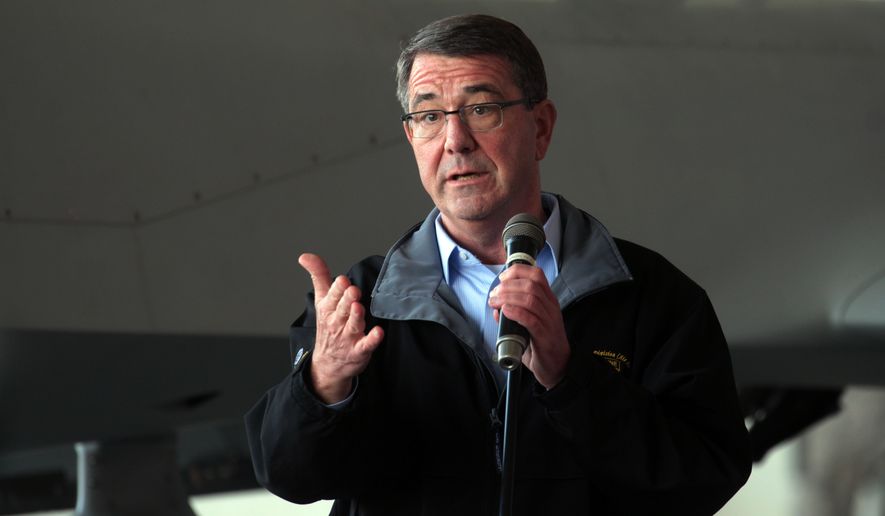Defense Secretary Ashton Carter said Wednesday that American commandos are on the ground in Syria embedded with anti-Islamic State rebels and are finding new targets for coalition aircraft to strike.
Mr. Carter said that on the Iraq front, a proposed special task force to hunt and kill leaders of the Islamic State, also known as ISIL and ISIS, is now active.
It is, he said, “preparing to work with the Iraqis to begin going after ISIL’s fighters and commanders, killing or capturing them wherever we find them, along with other key targets.”
Mr. Carter, while vague on the exact operations and locations of about 40 special operations troops, said they are aiding Syrian Arab and Kurdish local forces. One major objective is to cut off the Islamic State’s capital, Raqqa, from supplies and fighters.
“I can tell you these forces have already established contact with new forces that share our goals, new lines of communication to local, motivated and capable partners, and new targets for airstrikes and strikes of all kinds,” Mr. Carter told soldiers of the Army’s 101st Airborne Division at Fort Campbell, Kentucky.
“These operators have helped focus the efforts of the local, capable forces against key ISIL vulnerabilities, including their lines of communication. They are generating new insights that we turn into new targets, new strikes and new opportunities,” he said.
Such a team of U.S commandos typically include Joint Terminal Attack Controllers. Sophisticated spotters give the rebels new capability to see a target on the ground and communicate its location with strike aircraft above or with a joint command center in Irbil in the Kurdish region of Iraq.
“Through even a small number of these highly trained operators, the full might of America’s airstrikes, intelligence, logistics and know-how can be relentlessly focused on the enemy,” Mr. Carter said.
With the U.S. now not only directing Syrian rebels, but also equipping them, the battle is changing in eastern Syria, Mr. Carter said.
He said the American-Syrian rebel alliance is producing “action which is generating new tactical and operational ideas. Action which flushes ISIL out into the open, shrinking its power base, its finances and its space to maneuver.”
The defense secretary said the war’s next two major goals are to isolate Raqqa, as well as the Islamic State’s other operational hub, Mosul, Iraq’s second-largest city. The U.S. and Iraq are now planning an invasion of Mosul, which would be the most challenging ground operation to date.
There are no active plans for invasion of Raqqa at this time simply because ground forces are insufficient.
Some 101st Airborne elements are scheduled to deploy to Iraq, where about 3,500 U.S. troops are training and advising Iraqis. Mr. Carter said they will play a crucial role in the planned invasion of Mosul later this year.
It was the vaunted 101st Airborne that first captured Mosul in the 2003 U.S. invasion to oust dictator Saddam Hussein. U.S. forces left Iraq in December 2011. The Islamic State overran the city in 2014 as local security forces retreated.
Citing the 101st’s history, Mr. Carter used its Mosul operation to defend the Obama administration’s strategy of having Iraqis take the lead, as they did this month in retaking Ramadi, west of Baghdad.
“Frankly, I know the 101st has taken Mosul before, and you could do it again,” he said. “We could deploy multiple brigades on the ground and arrive in force. But then it would likely become our fight and very likely our fight alone. Moreover, we’d have to fight on the enemy’s terms and give up our greatest advantages — mobility, firepower and precision.”
He said he wants to deny the Islamic State a propaganda tool from which to recruit even more terrorists from Europe and the Middle East.
“We can’t ignore this fight, but we can’t win it entirely from the outside-in,” he said. “That’s why we’re helping local, motivated and capable forces on the ground in every way we can without taking their place.”
He said the Mosul invasion will involve Kurdish forces in the north and Iraqi army soldiers from the south.
Addressing the soldiers about their new mission in Iraq, he said, “The training you will provide Iraqi forces — both the Iraqi army and peshmerga — will be critical, as the peshmerga approach Mosul from the north to form a pincer movement with the Iraqi Security Forces and Counterterrorism Service approaching from the south. Reaching and retaking Mosul will not be easy, and it will not be quick. There will be many engagements in between.”
Mr. Carter again made an appeal to other nations to do more in the fight against the Islamic State. He did not name names, but the administration is known to be unhappy with Muslim-majority countries for not providing more troops and for not doing more to counter the Islamic State’s extremist message.
“There is also an opportunity for those nations who have been on the wrong side of this fight so far — Russia and Iran,” he said. “They can make a difference by stopping their unending support for Bashar Assad — a chief instigator of radicalism and terrorism in Syria.”
• Rowan Scarborough can be reached at rscarborough@washingtontimes.com.




Please read our comment policy before commenting.